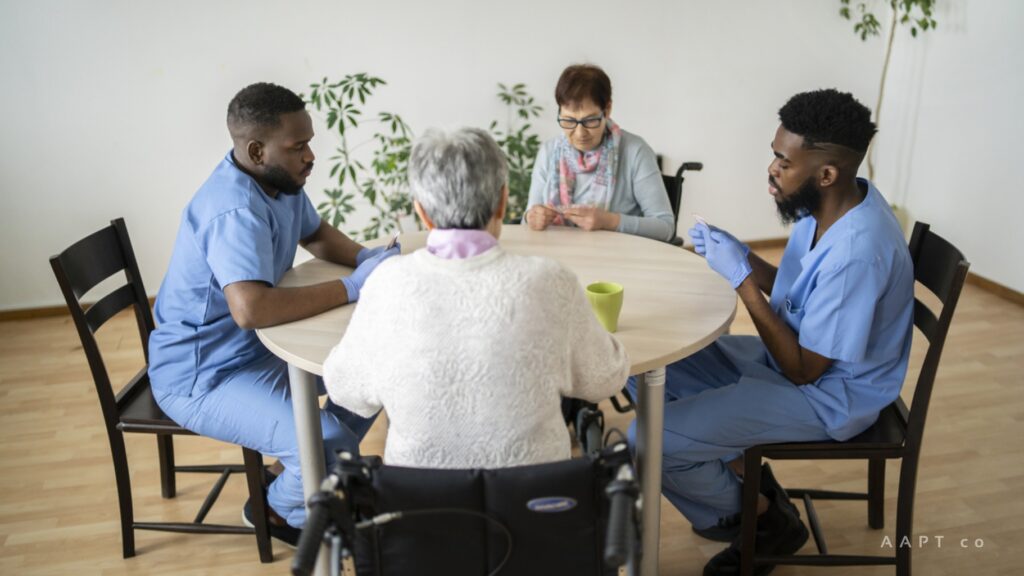Community Medical Network Nurses in Enhancing Community Health
Hospitals and other specialized medical facilities are not the only institutions that affect community health.
Rather, it is the result of a vast, well-organized network of healthcare providers coming together to meet the specific requirements of regional populations. Dedicated nurses who are key players in local practices are at the center of this network.
This article examines the value of a strong local medical network and how nurses contribute to the health of their patients, highlighting their roles, difficulties, and beneficial effects on community health.
The foundation of community health
The general wellbeing of a community’s citizens is reflected in the health of that community. It includes the prevention of sickness as well as the enhancement of physical, mental, and social wellbeing. This foundation is based on a strong community health network, which serves as its cornerstone. It consists of community-based groups, public health organizations, specialists, and primary care practitioners. Nurses, the backbone of this network, provide a human touch that can truly make a difference.
The role of nurses in community practices
Nurses are crucial contributors to community practices as they provide treatment in a variety of locations, including clinics, schools, and hospitals. They offer a comprehensive approach to care and act as a link between patients and other healthcare professionals. Beyond simple medical procedures, they also serve as emotional support for patients and their families as well as educators and activists.
Additionally, nurses act as a voice for their patients. They make sure people receive the right treatment and are given access to the right community services. This campaign includes addressing social factors that affect health, such as housing, food access, and financial security. To address the core causes of health disparities within their communities, nurses are rigorous in recognizing that health is dependent on these variables.
In the realm of mental health, nurses within community practices often serve as front-line providers of emotional support. They lend a sympathetic ear, helping patients navigate the complex web of emotions that can accompany illness or life changes. This emotional support can be a lifeline for patients dealing with chronic conditions, mental health challenges, or major life transitions. Thus, nurses bring a human touch to healthcare, fostering a sense of trust and compassion that is vital for community wellbeing.
Access to care
A key component of community health is access to healthcare, and nurses are essential in ensuring that this access is not constrained by the location or socioeconomic status of the patient. Through their work in communities, nurses dismantle obstacles that keep people from seeking medical attention. They make healthcare easier and more available by providing services in places like schools, community centers, and even patients’ homes.
Nurses are a lifeline for underprivileged regions where access to care can be severely hampered by lack of transportation and limited resources. They offer essential services like vaccines, health screenings, and chronic illness management in areas the community can easily access. This method not only enhances health outcomes but also lessens the load on hospitals and emergency rooms, improving the effectiveness and efficiency of healthcare.
Nurses contribute to cultural competence within community practices in addition to physical accessibility. They are aware of the particular requirements and viewpoints of their patient base, making it possible to provide care is accessible, culturally acceptable, and sympathetic. As a result, community members are more likely to seek care without worrying about prejudice or misunderstandings. In essence, nurses improve not just the accessibility but also the quality and relevance of healthcare to the population.
Preventive healthcare and health education
Nursing is at the forefront of promoting wellness and illness prevention, which is a cornerstone of community health. They administer vaccines, health exams, and advice on leading a healthy lifestyle. Nurses enable patients and their families to make wise health decisions by offering health education programs.
Nurses are experts in translating complicated medical information into easily understood phrases, bridging the communication gap between patients and healthcare professionals. They place a strong emphasis on the value of routine exams, a good diet, exercise, and the management of chronic illnesses. By disseminating this information, nurses assist communities in actively managing their health, lowering the financial and medical burden of preventable illnesses.
Additionally, nurses play a crucial role in responding to public health emergencies like epidemics and pandemics. During such circumstances, their capacity to inform the public about infection control practices, immunization campaigns, and disease management is essential for community health. They assist communities and effectively address health issues by acting as public health advocates in addition to providing physical care.
Challenges faced by community nurses
Nurses face several difficulties in their daily work despite playing crucial roles in community healthcare. One significant barrier is the lack of nurses and other healthcare workers in many regions, especially in rural and underserved areas. The overwhelming pressure this exerts on the few nurses remaining can result in burnout and poorer treatment.
Budget and resource restrictions might also make it difficult for community practices to offer complete care. It may be difficult for nurses to get the tools, medications, and training required, which may limit their capacity to provide the best care possible.
In addition, working in areas of poverty, drug misuse, and mental illness can be emotionally draining on nurses. They frequently have firsthand experience with the socioeconomic determinants of health and may be concerned at the limited resources offered to address these underlying problems.
The positive impact of community nurses on population health
Despite the difficulties they encounter, community nurses significantly improve population health. Their work on outreach, health education, and preventative care benefits the populations they serve in general. They support healthier lifestyles, early intervention, and better health outcomes by lowering the prevalence of chronic diseases.
In addition, community nurses help their patients develop a sense of familiarity and trust. This trust motivates them to seek medical attention when necessary, resulting in early diagnosis and better treatment. Nurses contribute to reducing health disparities and bridging healthcare access gaps through their advocacy and assistance.
In areas with strong nurse-led initiatives, there are consistently lower healthcare costs, fewer hospital admissions, and better general health outcomes. These results emphasize the crucial part nurses play in improving the health and wellbeing of communities.
Strengthening community medical networks for the future
It is crucial for governing bodies to make investments in nurse recruitment and retention within community practices to guarantee the ongoing sustainability of community medical networks. Programs like loan forgiveness, scholarships, and better working conditions can all be implemented to solve the nursing shortage and lower burnout rates.
Community practices should also work with neighborhood groups and governmental organizations to get the funding needed to deliver high-quality care. This covers the cost of supplies, instruction, and outreach initiatives that deal with the social determinants of health.
To create policies that support nurses’ work, it is essential to emphasize the role of nurses in community health. Advocates for increased scope of practice, fair pay, and better staffing ratios can help nurses deliver even more comprehensive care in their communities. The best way to strengthen community care networks is to complete a master’s degree in nursing. Programs, such as the excellent course offered by Walsh University, can be completed virtually, and students will learn from some of the best professors available.
The future of community health integration
Looking ahead, a viable way to significantly improve community health is utilizing technology in local healthcare networks. There are opportunities to expand the reach of community nurses and enhance patient care through telehealth, electronic health records (EHRs), and remote monitoring technologies.
Telehealth services in particular have experienced substantial growth, enabling nurses to perform virtual visits, monitor patients from a distance, and offer prompt consultations. This technology development is especially useful in rural areas where there may be limited physical access to healthcare providers. Additionally, it provides convenience for patients with transportation problems or mobility challenges.
EHRs also standardize healthcare data, facilitating smooth coordination and communication across various healthcare providers connected to the community network. To provide more effective and efficient care, nurses can access a patient’s medical history, treatment plans, and test results instantly.
Community healthcare networks that use data analytics have the potential to diagnose diseases earlier and allocate resources more effectively. To pinpoint interventions and enhance community health outcomes, nurses can use data-driven insights to identify health trends in their communities.
Conclusion
Promoting and maintaining community health requires a robust local medical system with nurses at the center. Within community practices, nurses take on a variety of tasks as educators, advocates, and emotional supporters. They contribute to preventative healthcare and health education, and they improve access to care, especially for underprivileged people. Despite obstacles, community nurses contribute to population health and ought to be admired and supported for their commitment to the welfare of their neighborhoods. To create healthier, more resilient communities in the future, it is crucial to strengthen local medical networks and to invest in the nursing workforce.
Recommended For You
9 Homemade Butter Advantages You Must Know
Most Inside
Most Inside offers high-quality recommendations and valuable updates to enhance all aspects of your life, providing premium guidance and enriching experiences.





